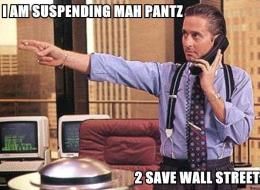A $700 billion slap in the face
The initial Treasury stance on the bailout was one of sheer demand for authority: give us total discretion and a blank check, and well fix things. There was no explanation of the theory of the case of why we should believe the proposed intervention would work. So many of us turned to our own analyses, and concluded that it probably wouldnt work unless it amounted to a huge giveaway to the financial industry.
Now, under duress, Ben Bernanke (not Paulson!) has offered an explanation of sorts about the missing theory. And it is, in effect, a metastasized version of the slap-in-the-face theory that has failed to resolve the crisis so far.
Before I explain the apparent logic here, lets talk about how governments normally respond to financial crisis: namely, they rescue the failing financial institutions, taking temporary ownership while keeping them running. If they dont want to keep the institutions public, they eventually dispose of bad assets and pay off enough debt to make the institutions viable again, then sell them back to the private sector. But the first step is rescue with ownership.
Thats what we did in the S&L crisis; thats what Sweden did in the early 90s; thats what was just done with Fannie and Freddie; its even what was done just last week with AIG. Its more or less what would happen with the Dodd plan, which would buy bad debt but get equity warrants that depend on the later losses on that debt.
But now Paulson and Bernanke are proposing, very nearly, to do the opposite: they want to buy bad paper from everyone, not just institutions in trouble, while taking no ownership. In fact, theyve said that they dont want equity warrants precisely because they would lead financial institutions that arent in trouble to stay away. So were talking about a bailout specifically designed to funnel money to those who dont need it.
It took four days before P&B offered any explanation whatsoever of their logic. But as of now, it seems that the argument runs like this: mortgage-related assets are currently being sold at fire-sale prices, which dont reflect their true, hold to maturity value; were going to pay true value and that will make everyones balance sheet look better and restore confidence to the markets.
As I said, this is really a giant version of the slap-in-the-face theory: markets are getting hysterical, and the feds can calm them down by buying when everyone else is selling.
So, three points:
1. Theyre still offering something for nothing. In major financial crises, the beginning of the end comes when the government accepts that it will have to pay some cost to recapitalize the banks. But in this case theyre still insisting that its basically a confidence problem, and it we can wave our magic wand a $700 billion magic wand, but thats just to impress people the whole thing will go away.
2. Theyre asserting that Treasury and the Fed know true values better than the market. Just to be fair, its possible, maybe even probable, that mortgage-related paper is being sold too cheaply. But how sure are we of that? There are plenty of cash-rich private investors out there; how many of them are buying MBS? And isnt it bizarre to have officials who miscalled so much All the signs I look at, declared Paulson in April 2007, show the housing market is at or near a bottom confidently declaring that they know better than the market what a broad class of securities is worth?
3. Even if it works, the system will remain badly undercapitalized. Realistic estimates say that there will be $800 billion or more of real, medium-term not fire-sale losses on home mortgages. Only around $480 billion have been acknowledged by financial institutions so far. So even if the fire-sale discount is removed, well still have a crippled system. And Paulson is offering nothing to fix that unless he ends up paying much more than the paper is worth, by any standard.
Meanwhile, Paulson and Bernanke seem to be digging in their heels against equity warrants or anything else that would make this a more standard financial rescue. I say no deal on those terms and if the lack of a deal puts the financial world under strain, blame Paulson and Bernanke, who have wasted most of a week demanding authority without explanation.

